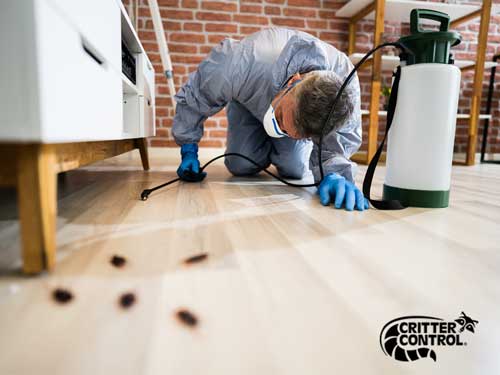Efficient Pest Control Providers: A Thorough Consider Elimination Techniques and Avoidance Procedures
In the realm of pest control solutions, the effective management of problems needs a careful approach that integrates different techniques and procedures for both removal and avoidance. From Integrated Insect Administration (IPM) approaches that focus on sustainable remedies to chemical elimination techniques created for targeted elimination, the toolbox versus pests is diverse and huge.

Integrated Insect Administration (IPM) Techniques
Integrated Parasite Management (IPM) Strategies incorporate a comprehensive method to pest control that focuses on prevention, monitoring, and control techniques to properly manage bug populaces. By integrating various methods, IPM intends to decrease the impact of insects while likewise lowering the reliance on chemical pesticides. Prevention lies at the core of IPM, highlighting techniques like appropriate hygiene, maintenance of hygiene, and sealing entry points to prevent bugs from infesting structures.
Chemical Elimination Strategies
Chemical elimination strategies are commonly employed in pest control services to efficiently eliminate bug populaces that posture a threat to human health and residential or commercial property. These methods include using various chemical substances particularly made to target and eliminate insects such as bugs, rats, and various other unwanted creatures. The application of chemicals, insecticides, rodenticides, and various other chemical representatives is carefully managed to ensure maximum performance while reducing threats to people, pet dogs, and the environment.
One of the essential advantages of chemical extermination techniques is their capability to give quick and targeted results, making them especially beneficial in situations of extreme problems or immediate bug control demands - a1 commercial pest control portland. However, it is vital to highlight the value of appropriate handling, application, and disposal of these chemical items to protect against unexpected injury
Additionally, incorporated parasite monitoring (IPM) approaches frequently integrate chemical extermination strategies with various other approaches such as cleanliness, environment alteration, and biological controls to produce a comprehensive and lasting bug control strategy. By integrating chemical extermination methods deliberately within an IPM framework, parasite control services can properly manage parasite populations while reducing possible threats to human health and wellness and the setting.
Biological Parasite Control Techniques
Using all-natural killers and bloodsuckers to handle insect populations is a sustainable technique known as biological insect control. a1 pest control portland bed bugs. One common organic control approach entails introducing natural enemies of the target pest varieties, such as ladybugs for aphid control or nematodes for termite problems.
One more efficient biological control strategy is using microbial pesticides. These are normally taking place microbes, such as bacteria, fungi, and infections, that specifically target and contaminate specific insect types. By utilizing these microbial agents, parasite populaces can be successfully lowered without hurting useful microorganisms or causing damage to the atmosphere.
Physical Insect Prevention Steps
Carrying out physical bug avoidance actions entails making use of obstacles and architectural modifications to deter insects from infesting a home or going into. Mounting door sweeps, displays on home windows, and sealing splits in the foundation can aid avoid bugs like pests and rodents from obtaining access inside your home.
Another physical avoidance measure is the usage of barriers like fence to maintain bigger pests such as raccoons or deer away from the residential property. By applying these physical pest prevention actions, building owners can dramatically minimize the risk of bug infestations and the damage they can trigger.
Professional Pest Examination Procedures
Performing systematic and thorough parasite inspections is a fundamental facet of specialist pest management protocols. Professional insect inspectors are trained to carefully analyze residential or commercial properties for signs of infestations, determining pest types, entrance factors, and helpful conditions.

Final Thought
In conclusion, effective bug control solutions use a selection of techniques, including Integrated Bug Monitoring approaches, chemical elimination techniques, biological controls, and physical prevention measures. Specialist pest inspection procedures play an important role in identifying and resolving pest problems in a timely way. By carrying out a mix of these techniques, homeowner can efficiently take care of and prevent insect infestations.
From Integrated Pest Management (IPM) techniques that focus on lasting remedies to chemical elimination techniques designed for targeted removal, the toolbox against pests is diverse and huge.Integrated Parasite Monitoring (IPM) Methods encompass an extensive method to pest control that focuses on control, surveillance, and avoidance approaches to properly handle bug populations.Chemical extermination methods are generally employed in pest control services to successfully get rid of parasite populaces that position a danger to human wellness and residential property.Using natural predators and parasites to handle parasite populaces is a sustainable method known as biological insect control.In final thought, reliable pest control services employ a range of strategies, including Integrated Bug Monitoring techniques, chemical extermination approaches, organic controls, and physical avoidance steps.